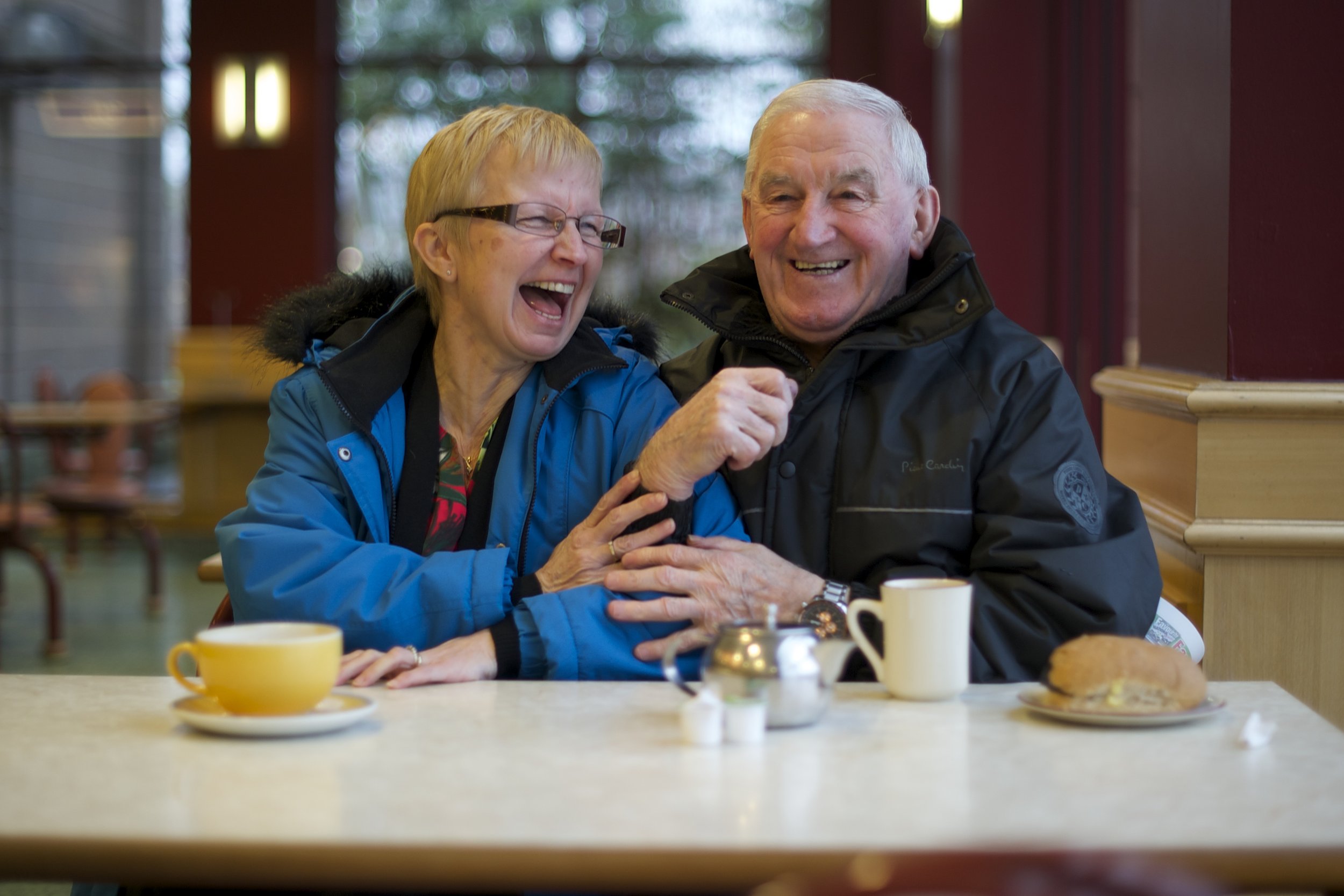Travel
Helpful Hints for travel
For many of us travelling has been a big part of our lives, whether our travels take us just down the road or far off lands. A diagnosis of dementia shouldn’t stop us or our loved ones from travelling, though it may require a different level of planning than in the past. You may have found that your ventures away from home have dwindled and you may be worried about whether you could still travel.
Whether you want to travel locally or further afield, we have included ideas for an emergency travel bag or e-bag designed to help you have access to the things you might need in case of an emergency and will hopefully help put you at ease to better enjoy your holiday.
Starting out with a “staycation”
The first trip doesn’t necessarily mean you have to travel far. Give yourself the opportunity to experience some aspects of going on holiday, but close to home. That means if you do feel overwhelmed you can easily return home. This is what we mean by a stay-cation, by going to a local hotel or Bed & Breakfast (B&B) if you are unsure of venturing too far. If it is a success then it may give you the confidence to venture further afield next time. If it does not go to plan, you can reflect and think about why it didn’t work and try to identify things you might need to do differently when you make your next attempt.
A local B&B or a small hotel may be a good choice to start with as they are easier to navigate with fewer long corridors and identical room doors. Another advantage is that there is more likely to be consistency in the staff who work there. This will mean that you may not have to explain your situation as often and will likely receive more personal service.
If reflections in mirrors, windows, or TV screens cause distress consider how you might cover them up. Also, for people with dementia who experience changes in their visual perception you may find that some patterns in carpet or wallpaper can be puzzling or even frightening. Don’t be afraid to ask to switch rooms.
If someone struggles with visual perception, poor lighting will often reduce an individual’s confidence and comfort in a space. Request additional lamps if this is the case with your room.
Try to maintain your routines around eating and sleeping. This is something that is often variable when we travel, but too much change to daily routines can contribute to increased disorientation, irritability and fatigue.
Keep some notes. You don’t have to record everything, but note down things that were difficult and things that went well, this will help you plan for future trips.
Emergency travel bag (e-bag)
The following are suggestions of items that may be helpful to have in your emergency travel bag:
Emergency numbers and contact details
Medication lists
GP information
Information regarding allergies, sensitivities and diagnosis
A recent photo
An emergency contact list to provide to the reception desk or accommodation owner on arrival.
Top Tip: A brief description of the person with dementia would be helpful, including their diagnosis and how they are impacted by their dementia. Raise awareness of any other medical conditions they may have which may also impact on their well-being.
Building your comfort level
If you are ready to try somewhere further afield but not yet ready to tackle an extended holiday, look for a weekend bolt-hole. This can be a place that you used to visit regularly or a new place that matches up with your interests and desired outcomes for the trip. One couple found a little B&B near outdoor walking paths and an easy walk to the village pub, they return every couple of months for a weekend away. There are some great advantages to finding a place like this that suits you.
When choosing a place to stay, think about what is important to you:
Does it have things to do that you enjoy nearby?
Is there public transportation if you need it?
Over-stimulation can be exhausting when away from home, so is the accommodation peaceful and private?
You may want to stay somewhere reasonably close to home (2 or 3 hour journey) because if you need to go home or need support from a family member or friend you are not so far away.
People will get to know you, whether it is the owner of the accommodation or the local coffee shop. When people are familiar with you, and aware of your situation, they are more likely to be understanding of difficult moments and you are more likely to be supported during your stay.
You will become familiar with the space and have a good idea if there is anything that needs to be adapted for your stay. Once they know you, most hosts/small business owners will do this for you in advance if you let them know what you need.
You will get to know what is available locally and when it is available, such as restaurant opening times, public transport and points of interest.
Top Tip: Take a digital photo of the individual with dementia each morning. That way if you get separated and need assistance, you will have an up to date photo and you will know what they were wearing.
Prepare and take time to choose your holiday carefully
While it is impossible to anticipate every need you might have on a holiday, there are quite a few things you can consider that may make the experience more relaxing and enjoyable. We all put thought into where we go on holiday, but when managing symptoms of dementia, thinking carefully about how you get there can be just as important to a successful holiday.
There are many strategies that have been used by others to great success:
Consider going in a group. A carer recently shared with us his strategy for holidays; he has found another local carer that he teams up with for holidays and they go as two couples. This ensures that there is always someone there for support and to visit the sights or go out to eat with, but it also creates opportunities for alone time as well. They often rent a large cottage or villa together and share the cooking responsibilities.
Check out dementia friendly tours and sponsored dementia holidays. There are a growing number of organisations that specialise in organising holidays with additional support such as Dementia Adventure or Shared Care Scotland. There are other organisations who do similar trips so it is worth doing some research to find one that meets your needs.
Some people find that going on a cruise is a good option for them as the meals are taken care of and the day trips are often organised and available for you if you wish. There are also natural boundaries on a ship that may make the trip feel more manageable for some.
Planning the details
Every trip requires some advanced planning but the better prepared you are the more at ease you are likely to be. The following are some things to think about when you are planning out the details of your trip:
Write out a detailed itinerary for the trip and include your flight or train times and your estimated times for departure and arrival. Whatever you decide, go easy on yourself and build in flexibility to your plan. Travelling is exhausting so build in lots of time to rest and you may find that going out to do one activity or see one site a day suits you, or you may want to cut that back to every other day. Useful information provided by Care UK.
When choosing flights, train or bus journeys, choose the most direct option that you can afford. Having fewer changes at airports/stations can help reduce some stress.
It might be helpful to take multiple copies of your passports, ID cards, and other travel documents and store individual copies in different bags.
Talk to your GP about any time sensitive medications, especially if flying over multiple time zones. Plan out how to ease the medication transition both for the journey there and for the journey back. This may be something you want to note on your itinerary.
If over stimulation is problematic for the person living with dementia, invest in some good quality, over ear, noise cancelling headphones. Not only will this provide a distraction on the journey by providing music or when watching movies, but it can be very helpful in blocking out the noise of other travellers and assist with audio stimulation management.
If the person living with dementia has periods of disorientation, and especially if there will be a language barrier, you may want to purchase an identification bracelet with an emergency contact number on the back. Other aids that may be beneficial include cards that let people know that the bearer has dementia and how it impacts them, which can be kept in a wallet or purse.
Finally, call ahead if special assistance may be needed. Many airlines request 48 hours’ notice to have a wheelchair escort available. Even if it is not necessarily needed, you may feel more relaxed knowing it is available.
Plane and train travel
Top Tips to consider when travelling:
Take headphones if the person likes to listen to music and keeps them calm.
Give yourself plenty of extra time to get to your plane/train.
In airports, always go through security behind the person with dementia. If you go first you will not be able to assist them if they are stopped for any reason.
Stay well hydrated.
Bring some snacks to ward off low blood sugar and irritability.
If you are on a long journey, get up and walk around at least every two hours to reduce your risk of blood clots. Wearing flight socks can also reduce risk.
In airports utilise quiet spaces such as prayer rooms or unused lounges to reduce stimulation during layovers.
Do not be afraid to ask for help! You can request assistance at most airports, use it.
It is hoped the hints and tips above can help you consider the possibilities of travel and help with planning a break away. There may be extra planning and you may think it is too much effort but sometimes that effort can really make a difference to your experience.
Resources
The DSDC team would like to take this opportunity to wish you well in your future endeavours. If you would like to share your travel experiences, we would love to hear from you click here for contact details. Read more about travelling in DSDC’s 10 Helpful Hints for travel. If you live in Scotland you can request the 10 Helpful Hint series for free, thanks to funding.






